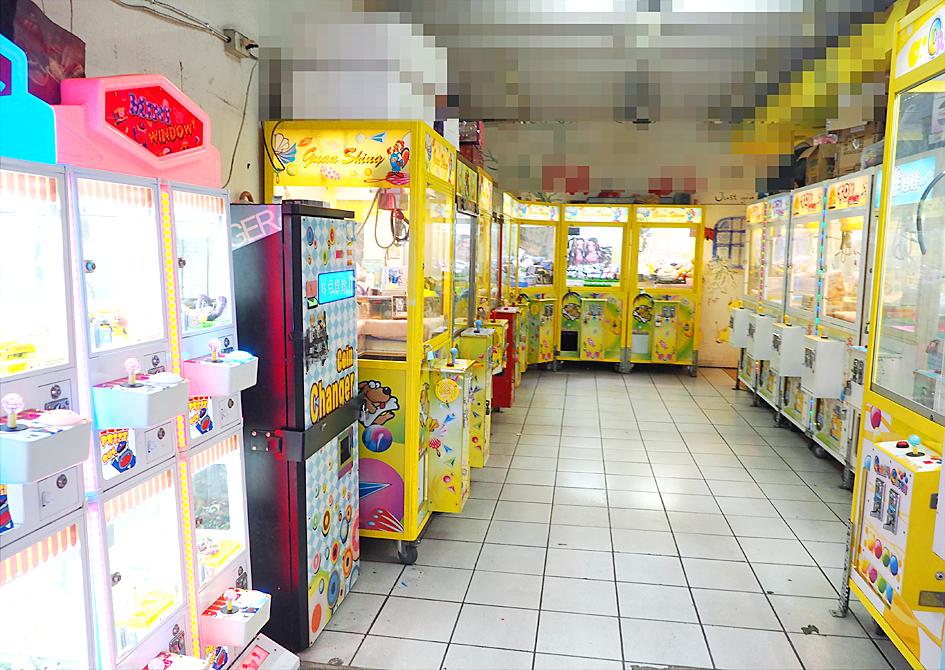Most of the entertainment tax in northern Taiwan came from golf venues, while claw machines dominated central Taiwan, the Ministry of Finance said in a report.
Revenue from golf venues made up 33 percent of the total entertainment tax collected in the north, while revenue from claw machine parlors accounted for nearly 30 percent in central Taiwan, the report said.
KTV parlors reigned supreme in eastern Taiwan, generating 37 percent of the total entertainment tax revenue there, while Internet cafes, arcades and KTV parlors were the biggest contributors in the south at about 50 percent of the total.

Photo: Chen Feng-li, Taipei Times
The number of taxable golf venues, KTV parlors, movie theaters, arcades and Internet cafes fell from 2011 to last year, the report said.
However, claw machines were the fastest-growing type of entertainment during the period, as the number of taxable establishments shot up from 16,000 in 2011 to 120,000 last year, it said.
The amount of entertainment tax collected from KTVs, arcades and Internet cafes fell during the period, while tax collected from people in performance-related careers grew, it showed.
The COVID-19 pandemic has nearly halved the amount of entertainment tax collected nationwide last year, with cinemas, which had until then proven to be relatively stable establishments, also generating lower taxes, the report said.
Claw machine parlors saw minor gains in taxable income last year, while taxable income at golf venues — where it is easier to practice social distancing — rose to NT$410 million (US$14.67 million), or 24.3 percent of the total entertainment tax revenue, the report showed.
In related news, a survey by the Taiwan Creative Content Agency on spending trends for cultural content suggested that over-the-top (OTT) media platforms were giving cable TV a run for its money, with only 19.3 percent of respondents watching both platforms.
About 80.9 percent of respondents under 40 said they preferred OTT services, while 49.1 percent of those over 40 used OTT services, the survey conducted last month found.
Netflix dominated the OTT market, with 49.1 percent of OTT users in the survey saying they preferred its services, while 14 percent preferred iQiyi, 13.1 percent used YouTube Premium, 7.6 percent watched Line TV, 7.4 percent chose friDay, 6.1 percent used KKTV and 5.1 percent preferred LiTV. The respondents were allowed to choose more than one answer.
Respondents aged 55 to 69 made up the main TV audience, as 27.8 percent of them said they watched nothing but television.
As for music streaming services, Taiwanese listened to 1.16 hours of streamed music per day on average, with KKBox remaining the top choice at 53.6 percent and Spotify coming second at 33.4 percent, with YouTube Music in third place at 26.3 percent and Apple Music in fourth place at 19.9, the survey found.
While those with subscriptions tended to subscribe to more than one service, a majority of respondents preferred subscription-free music, the survey said.

Taiwan has received more than US$70 million in royalties as of the end of last year from developing the F-16V jet as countries worldwide purchase or upgrade to this popular model, government and military officials said on Saturday. Taiwan funded the development of the F-16V jet and ended up the sole investor as other countries withdrew from the program. Now the F-16V is increasingly popular and countries must pay Taiwan a percentage in royalties when they purchase new F-16V aircraft or upgrade older F-16 models. The next five years are expected to be the peak for these royalties, with Taiwan potentially earning

STAY IN YOUR LANE: As the US and Israel attack Iran, the ministry has warned China not to overstep by including Taiwanese citizens in its evacuation orders The Ministry of Foreign Affairs (MOFA) yesterday rebuked a statement by China’s embassy in Israel that it would evacuate Taiwanese holders of Chinese travel documents from Israel amid the latter’s escalating conflict with Iran. Tensions have risen across the Middle East in the wake of US and Israeli airstrikes on Iran beginning Saturday. China subsequently issued an evacuation notice for its citizens. In a news release, the Chinese embassy in Israel said holders of “Taiwan compatriot permits (台胞證)” issued to Taiwanese nationals by Chinese authorities for travel to China — could register for evacuation to Egypt. In Taipei, the ministry yesterday said Taiwan

Taiwan is awaiting official notification from the US regarding the status of the Agreement on Reciprocal Trade (ART) after the US Supreme Court ruled US President Donald Trump's global tariffs unconstitutional. Speaking to reporters before a legislative hearing today, Premier Cho Jung-tai (卓榮泰) said that Taiwan's negotiation team remains focused on ensuring that the bilateral trade deal remains intact despite the legal challenge to Trump's tariff policy. "The US has pledged to notify its trade partners once the subsequent administrative and legal processes are finalized, and that certainly includes Taiwan," Cho said when asked about opposition parties’ doubts that the ART was

If China chose to invade Taiwan tomorrow, it would only have to sever three undersea fiber-optic cable clusters to cause a data blackout, Jason Hsu (許毓仁), a senior fellow at the Hudson Institute and former Chinese Nationalist Party (KMT) legislator, told a US security panel yesterday. In a Taiwan contingency, cable disruption would be one of the earliest preinvasion actions and the signal that escalation had begun, he said, adding that Taiwan’s current cable repair capabilities are insufficient. The US-China Economic and Security Review Commission (USCC) yesterday held a hearing on US-China Competition Under the Sea, with Hsu speaking on